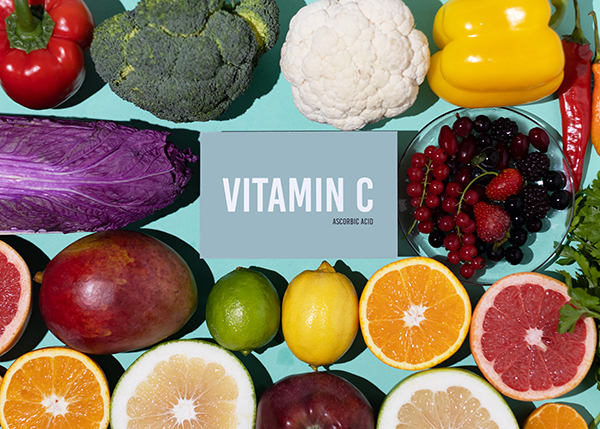Vitamin C, also known as ascorbic acid, is a water-soluble vitamin that plays a vital role in maintaining our health and well-being. It is perhaps one of the most well-known and widely used vitamins due to its immune-boosting and antioxidant properties. While it is commonly associated with fighting off colds and flu, Vitamin C offers a plethora of other benefits that extend far beyond its role in preventing infections. In this blog, we will explore what Vitamin C is, how much of it our bodies need, who is at risk of deficiency, the symptoms of Vitamin C deficiency, the numerous benefits it provides, and the best food sources to ensure we get an ample supply of this crucial nutrient.

What is Vitamin C?
Vitamin C is a water-soluble vitamin that cannot be synthesized by the human body, meaning we must obtain it from external sources like food or supplements. It is a potent antioxidant that helps neutralize harmful free radicals, which are unstable molecules that can damage cells and contribute to the aging process and the development of various diseases. Beyond its antioxidant properties, Vitamin C plays a crucial role in collagen synthesis, iron absorption, and maintaining a healthy immune system.
How Much Vitamin C Do I Need?
The recommended daily intake of Vitamin C varies depending on age, gender, and life stage. For most adults, the recommended daily allowance (RDA) is around 65-90 milligrams (mg) per day. However, during certain circumstances like pregnancy, lactation, illness, or intense physical activity, the body’s demand for Vitamin C may increase. It is essential to meet the daily recommended intake to ensure optimal health and functioning.
Who is Likely to be Vitamin C Deficient?
Vitamin C deficiency, also known as scurvy, is relatively rare in developed countries due to the widespread availability of fresh fruits and vegetables. However, certain groups are more prone to Vitamin C deficiency:
- Smokers: Smoking increases oxidative stress, which can deplete Vitamin C levels in the body. Smokers are recommended to consume additional Vitamin C to counteract this effect.
- People with limited access to fresh produce: Individuals living in food deserts or areas with limited access to fresh fruits and vegetables may be at higher risk of Vitamin C deficiency.
- Older adults: As people age, their dietary habits may change, leading to a decreased intake of Vitamin C-rich foods.
- Individuals with certain medical conditions: Certain medical conditions, such as malabsorption disorders, may hinder the absorption of Vitamin C from the diet.
How Would I Know if I am Vitamin C Deficient?
Vitamin C deficiency can manifest in various ways, and early detection is crucial to prevent complications. Some common signs and symptoms of Vitamin C deficiency include:
- Fatigue and weakness
- Joint and muscle aches
- Easy bruising
- Dry, damaged skin
- Frequent infections and slow wound healing
- Swollen, bleeding gums
- Anemia (due to impaired iron absorption)
If you suspect a Vitamin C deficiency, it is essential to consult a healthcare professional for proper diagnosis and treatment.
What are the Benefits of Vitamin C?
- Immune System Support:
Vitamin C is renowned for its immune-boosting properties. It strengthens the body’s natural defense mechanisms, such as white blood cells and antibodies, helping to fight off infections and illnesses more effectively.
- Antioxidant Powerhouse:
As a potent antioxidant, Vitamin C helps protect cells from oxidative damage caused by free radicals. This plays a crucial role in preventing chronic diseases, such as heart disease, cancer, and arthritis, and contributes to overall longevity.
- Collagen Formation:
Collagen is a structural protein that plays a vital role in skin health, wound healing, and joint support. Vitamin C is essential for collagen synthesis, helping maintain healthy skin, hair, and nails, and promoting faster wound healing.
- Cardiovascular Health:
Vitamin C promotes a healthy cardiovascular system by improving blood vessel function and reducing inflammation and oxidative stress. This can lead to a lower risk of heart disease and stroke.
- Iron Absorption:
Vitamin C enhances the absorption of non-heme iron, the type of iron found in plant-based foods. This is particularly beneficial for vegetarians and vegans, as it helps prevent iron deficiency anemia.
- Eye Health:
Vitamin C may help prevent age-related macular degeneration (AMD), a leading cause of vision loss in older adults. Its antioxidant properties protect the eyes from oxidative damage.
- Skin Protection:
Topical application of Vitamin C in the form of serums or creams can help protect the skin from UV damage, reduce hyperpigmentation, and promote a more youthful complexion.
Food Sources of Vitamin C
A well-balanced diet rich in fruits and vegetables can easily provide the daily recommended intake of Vitamin C. Some of the best food sources of Vitamin C include:
- Citrus fruits: Oranges, grapefruits, lemons, and limes are excellent sources of Vitamin C.
- Berries: Strawberries, blueberries, raspberries, and blackberries are packed with Vitamin C and other beneficial antioxidants.
- Kiwifruit: A single kiwifruit provides more than the daily recommended amount of Vitamin C.
- Bell peppers: Red, green, and yellow bell peppers are rich in Vitamin C and add color and flavor to dishes.
- Broccoli: This cruciferous vegetable is not only a good source of Vitamin C but also provides various other essential nutrients.
- Tomatoes: Whether fresh or in canned form, tomatoes contain Vitamin C and lycopene, another powerful antioxidant.
- Leafy greens: Spinach, kale, and Swiss chard are nutrient-dense greens that contribute to daily Vitamin C intake.
Vitamin C is an Essential Antioxidant
Vitamin C is a true powerhouse when it comes to supporting our health and well-being. As an essential antioxidant, it aids in neutralizing free radicals and reducing the risk of chronic diseases. From bolstering our immune system to promoting healthy skin and collagen synthesis, its benefits are vast and diverse. To ensure adequate Vitamin C intake, incorporating a variety of fruits and vegetables into our diet is essential. So, let’s savor the flavors of nature’s Vitamin C-rich gifts and make this vital nutrient a cornerstone of our daily nutrition for a healthier and more vibrant life.

Use Coupon Code: FREE
*Sorry, coupons can't be combined.